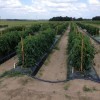Abstract
Salmonella and other human pathogens can contaminate produce at any stage from “farm to fork.” If we can better understand how production practices may make crops more or less susceptible to human pathogens, we may be able to significantly reduce the number and severity of the produce-associated outbreaks. This 3-page fact sheet provides up-to-date information about tomato production practices and their relationships with Salmonella. Written by Massimiliano Marvasi, George Hochmuth, and Max Teplitski, and published by the UF Department of Soil and Water Science, December 2014. (Photo: Max Teplitski, UF/IFAS)
References
Brandl, M. T., C. E. Cox, and M. Teplitski. 2013. "Salmonella interactions with plants and their associated microbiota." Phytopathology 103: 316-325. https://doi.org/10.1094/PHYTO-11-12-0295-RVW
Greene, S. K., E. R. Daly, E. A. Talbot, L. J. Demma, S. Holzbauer, et al. 2008. "Recurrent multistate outbreak of Salmonella Newport associated with tomatoes from contaminated fields, 2005." Epidemiol Infect 136: 157-165. https://doi.org/10.1017/S095026880700859X
Gutierrez-Rodriguez, E., A. Gundersen, A. O. Sbodio, and T. V. Suslow. 2012. "Variable agronomic practices, cultivar, strain source and initial contamination dose differentially affect survival of Escherichia coli on spinach." J Appl Microbiol 112: 109-118. https://doi.org/10.1111/j.1365-2672.2011.05184.x
Islam, M., J. Morgan, M. P. Doyle, S. C. Phatak, P. Millner, et al. 2004. "Persistence of Salmonella enterica serovar Typhimurium on lettuce and parsley and in soils on which they were grown in fields treated with contaminated manure composts or irrigation water." Foodborne Pathog Dis 1: 27-35. https://doi.org/10.1089/153531404772914437
Larbat, R., J. Le Bot, F. Bourgaud, C. Robin, and S. Adamowicz. 2012. "Organ-specific responses of tomato growth and phenolic metabolism to nitrate limitation." Plant Biol (Stuttg). https://doi.org/10.1111/j.1438-8677.2012.00564.x
Lopez-Velasco, G., A. Sbodio, A. Tomas-Callejas, P. Wei, K. H. Tan, et al. 2012. "Assessment of root uptake and systemic vine-transport of Salmonella enterica sv. Typhimurium by melon (Cucumis melo) during field production." Int J Food Microbiol 158: 65-72. https://doi.org/10.1016/j.ijfoodmicro.2012.07.005
Marvasi, M., A. S. George, M. Giurcanu, G. J. Hochmuth, J. T. Noel, et al. 2014. "Effects of nitrogen and potassium fertilization on the susceptibility of tomatoes to post-harvest proliferation of Salmonella enterica." Food Microbiol 43: 20-27. https://doi.org/10.1016/j.fm.2014.03.017
Marvasi, M., G. J. Hochmuth, M. C. Giurcanu, A. S. George, J. T. Noel, et al. 2013. "Factors that affect proliferation of Salmonella in tomatoes post-harvest: the roles of seasonal effects, irrigation regime, crop and pathogen genotype." PLoS One 8: e80871. https://doi.org/10.1371/journal.pone.0080871
Poza-Carrion, C., T. V. Suslow, and S. E. Lindow. 2013. "Resident bacteria on leaves enhance survival of immigrant cells of Salmonella enterica." Phytopathology 103. https://doi.org/10.1094/PHYTO-09-12-0221-FI

